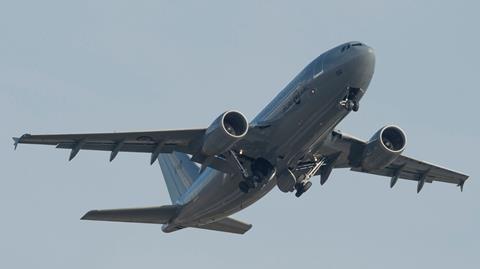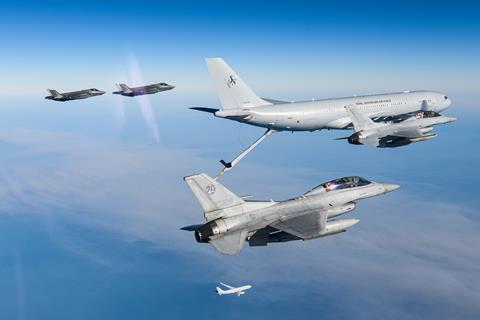The Canadian government has ordered the Airbus Defence & Space A330 Multi-Role Tanker Transport (MRTT) to serve as the country’s new in-flight refuelling jet.
Ottawa on 25 July said it had selected Airbus to provide the new Royal Canadian Air Force (RCAF) tanker, replacing the Airbus A310-300 derivative CC-150 Polaris multi-purpose transport.
“Following an open, fair and transparent procurement process, it was determined that [Airbus] was the only qualified supplier that met the project requirements,” the government says.

Ottawa plans to acquire nine MRTTs, which will be locally designated as the CC-330 Husky. Four aircraft will be new production A330s, with the remaining five being converted from used A330-200s.
The contract is valued at C$3.6 billion ($2.7 billion), according to the government. The decision to convert five previously used aircraft produced “significant cost savings”, Ottawa adds. The used A330s were acquired separately between 2022 and 2023 at a cost of $252 million. Conversion work will be funded under the Airbus contract.
Delivery of the first new-build MRTT aircraft to the RCAF is expected in 2027, according to Airbus. The newly-built A330-200s will be assembled in Toulouse, with conversion taking place at the company’s MRTT facility in Getafe, Spain.
“Under the agreement, the A330 MRTTs will be equipped with both the hose and drogue and a boom as refuelling options, cybersecurity solutions and countermeasures,” Airbus notes.
The Canadian government tells FlightGlobal that two of the converted A330s are currently undergoing pre-delivery maintenance, painting and preparation. The two MRTTs are expected to enter service with the RCAF in the autumn of 2023, following aircrew conversion from the current CC-150 type.
The RCAF currently operates five CC-150s, with two of the transports converted to provide air-to-air refuelling capability, according to Cirium data. The type also conducts VIP transport for Canada, serving as the so-called “Can Force One” jet that transports the prime minister and other senior officials.
Ottawa acquired the current Polaris fleet in 1992 and the government says the jets are nearing the end of their service life.
“The current fleet is ageing and cannot effectively perform all of its operational requirements, which has resulted in decreased mission flexibility,” the government notes.
The increased fleet size, and integral multi-role capabilities of the A330 MRTT will offer the RCAF “increased flexibility to fulfill a variety of missions with the same aircraft”, Ottawa says.
“The primary role of the fleet will be air-to-air refuelling, while simultaneously being equipped to airlift large numbers of Canadian armed forces personnel and their equipment in support of operations and training activities within Canada and around the world,” the government says.

CC-330s can also be reconfigured for specialised aeromedical evacuation. One of the new aircraft will be designated for Can Force One VIP transport duty.
Defence minister Anita Anand says Ottawa’s tanker investment reflects its commitment to the defence of the Canadian Arctic territories, which one senior official describes as the “western flank of NATO”.
“There is a pressing need to modernise the capabilities of the Royal Canadian Air Force in support of North Atlantic Treaty Organization and North American Aerospace Defense Command operations,” says Anand.
Ottawa has said it will invest some C$40 billion in Arctic defence infrastructure over the next two decades, of which adding in-flight refuelling capacity is part.
The RCAF’s new tanker fleet is expected to operate into the 2050s. Ottawa says the jets will offer air-to-air refuelling support to the country’s current Boeing CF-18 Hornet fighters and its future Lockheed Martin F-35A stealth fighters.
American fighters conducting air patrol missions under the joint Canada-US North American Aerospace Defense Command will also receive tanker support from RCAF CC-330 fleet.


























